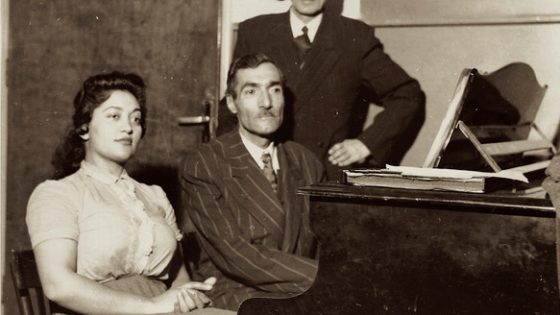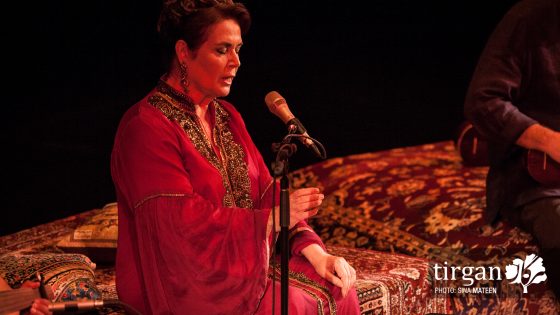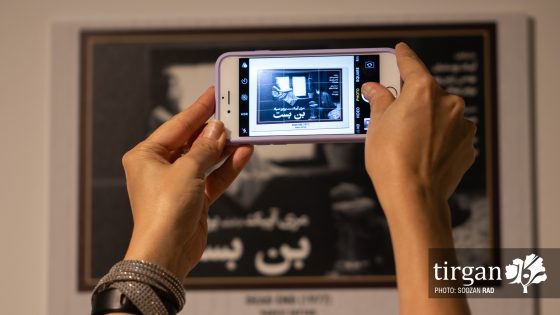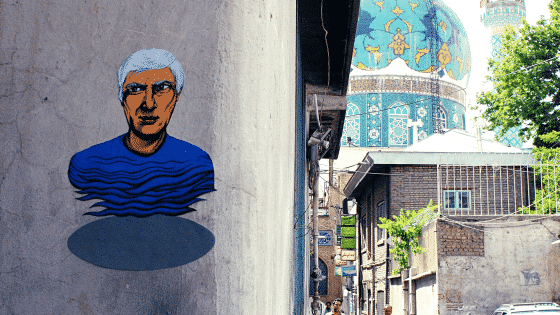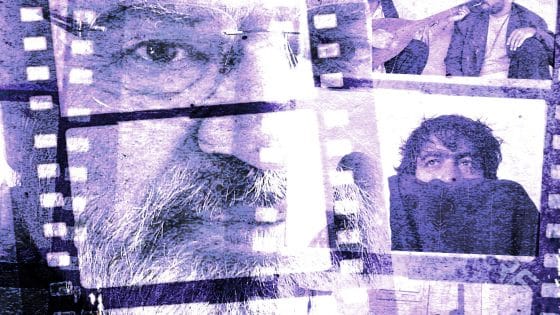on
What is certain about Sa’di’s life is that he flourished in the thirteenth century (7th century hijra), went to the Nezamiyeh College of Baghdad, travelled wide and lived long. It is clear from his love poetry that he was an ardent lover, and from much of his works that he was not a Sufi although he cherished the ideals of Sufism and admired the legendary classical Sufis. There is also a remarkable humanist tendency in his works two-and-a-half centuries before the emergence of Christian humanism in Europe. Not much else can be said about his life with the same degree of certainty.
In his introduction to Bustan, Sa’di writes that he had travelled far and wide and spent time with all manner of people. But none such as the people of Shiraz had he found in sincerity and generosity. Returning to his land, he thought that they normally brought sugar as gift from Egypt:
If I could not afford to bring sugar
I can offer words that are even sweeter 1
Thus he offered Bustanas a homecoming present to his fellow citizens. It is clear from this introduction that Sa’di had spent many years seeing the world. In Golestanthere are many tales and anecdotes which speak of the places the narrator had visited.
Birth and death
Sa’di was very probably born between 1203 and 1209.The date of his death has been consistently quoted to have been between 1291 and 1294, which would mean that he lived for a maximum of ninety-one years, a long – but not impossible – life for his time. Still, these dates may or may not be correct. In fact we lose chronological sight of Sa’di around 1281. 2
Sa’di left Fars in the wake of the arrival of the Mongols in pursuit of Jalal al-Din Menkaborni, Kharazmshah, in 1225 (622), when he was at least sixteen years old, but was probably around twenty. As noted, he presented Bustan to his fellow citizens as a gift for his return to Shiraz. In the introduction to that book he has recorded the date of its publication as 1257 (655):
It was six hundred and fifty five years after hijra
When this famous treasure was filled with pearls 3
He must therefore have returned home early to mid-1250s: given that he had left Shiraz in the 1220s, he had therefore spent thirty years of his life travelling abroad, learning, teaching, observing.
…I left the Turks’ den 4
when I saw
The world entangled like an African’s hair.
When I returned the country was calm
The wolves having shut their claws…
That is how it was then as you saw
A world full of turmoil and horror
Thus it is now under the just Sultan
Atabak Abubakr ibn Sa’d Zangi
This he wrote in the mid-1250s, unsuspecting the imminent second Mongol conquest when Baghdad itself was sacked, and he wrote two moving elegies,one in Persian and one in Arabic, mourning that catastrophe:
The heavens would be right to weep down blood full
For the fall of the realm of Musta’sim, Commander of the Faithful.5
Sa’di was a poet, a prose writer, a lover, a man of the world, as well as one who believed in personal propriety and social justice. He was a man of tolerance, moderation, great wit, and good sense, qualities which, added to his outstanding artistic talent, made him better known and more popular in his own time than any other poet in the history of Persian literature. In his works he mentions or alludes to the extent and spread of his popularity in the vast Persian speaking lands of the time.
Together with Ferdowsi, Rumi and Hafiz, his fame has been widespread in the Persian cultural region, and his works have been recited and appreciated even by illiterate Persian speakers throughout ages. His fame is unique however in the fact that he is the only Persian poet about whom the common folk have made up anecdotes and legends, even about his legendary daughter who is supposed to have inherited some of the wit of her great father.
Sa’di’s main works comprise the books Bustanand Golestan, ghazals or lyrics , and qasidehs or odes, though he has also written in other forms. He wrote on love, morals and manners, Sufism and good government. What follows is a brief review of his works on love and on good morals and manners.
A brief look at Sa’di’s love poetry
No classical Persian poet was a greater and more passionate lover than Sa’di. One may even make the higher claim that he was the greatest lover, certainly the greatest lyricist of human love, in classical Persian poetry. Yet the impact of Bustanand Golestanhas been so great that they have overshadowed the work of Sa’di as a poet of love-songs. Not only have they been seldom translated into western languages compared with those two books and especiallyGolestan, but even in Iran Sa’di’s ghazals have never been appreciated as much as they deserve in critical and scholarly studies.
Sa’di is the champion of human love, the mundane and corporeal love of the flesh, and Rumi, of mystical love, of the Sufi longing for return to and re-union with the origins of all existence. Hafiz integrates the two such that often in the same ghazalthey are both expressed with equal passion, or the expression of the one type of love at the same time implies that of the other, there being two layers in the meaning of the same verse. Many classical critics and scholars, both Persian and Western, have tended to interpret Sa’di’s love poetry as mystical.
This view flies in the face of the facts since the great majority of Sa’di’s ghazals are patently about the love of the flesh, and that of both sexes as well. Of his more than seven hundred ghazals, about ten per cent fall into the mystical-cum-ethical category. The rest refer to his rich and enviable love experience.6
Sa’di’s ghazals may be divided into four categories: those which express his love for the beloved; those which describe the beloved; those which express the joy of union; and those which reflect the sadness of separation.
The group of Sa’di’sghazals which merely contain expressions of love, describe and demonstrate the breadth and depth of the lover’s love and desire for the beloved, occasionally but not often also describing some of the qualities of the beloved and some of the feelings of the lover for being alienated from her.
In the following ghazalthe lover had tried hard to avoid falling in love, but seeing the beloved all his efforts proved futile. Not only did he lose his ‘reason’ in the face of the beloved, but he could not even keep his love a secret. The poem is impeccable but its climax is reached when the lover bids the beloved to go and see him at night: Come to me today in peace tonight. He asks her to see him in peace, which means to satisfy his desire. And he uses ‘today’ in the sense of ‘this day’ which also includes ‘tonight’.
وگر مراد نیابم به قدر وسع بکوش
The secret of love
I tried hard to hide the secret of love and desire,
It was not possible to stop boiling on fire.
I was alert from the start not to fall in love,
All reason faded seeing your face above.
Your mouth told the ears of my soul a story
And now the people’s warning is all a story.
You alone can stop the riot by hiding thy face,
I cannot bear to turn away my face …
Come to me today in peace tonight
I have not slept longing for you all night.
You gave me up for nothing yet I am determined
Not to sell a hair of yours for earth, sky and wind.
I’ll tell about my pain to someone who is wounded
Telling a healthy person I would be reprimanded…7
Now let us turn to the second group of Sa’di’s ghazals, the description of the beloved. The description of the beloved’s physical attributes proceeds at the same idealistic level as the expression of love. The beloved’s physical appearance is perfect and in complete harmony according to the contemporary aesthetic values. Her figure is often likened to a well-proportioned cypress-tree, her mouth to a flower bud, her body to silk and silver, her hair to a long chain, and so on.
In the following poem the beloved is described as being no less than the site of Kaaba around whom he could run as they do in the rituals of Hajj. She is a harvest of flower whose body is beyond description and is only reflected by her garment; and the sun would be ashamed to set its eyes on her. There is nothing in and about her which is not worthy of praise: figure, speech, movements, etc.
Site of Kaaba
You who have no pity for me at all
Blessed be your body and soul.
What should I praise, your figure
Your movements or speech of sugar.
Of your face must be ashamed the sun
When through the window it comes on.
I shall not elaborate on your body
Your garment itself tells its story.
You who are a harvest of flower
Give some to your flower’s beggar.
O ravishing beauty try to be as kind
As your moral beauty would demand
O site of Kaaba show me a sign
So I can turn around you like a divine
Take my hand in the few days of this world
So I will not hold you to God in the next world
Out of my heart I intend to throw you whole
And instead give you an abode within my soul…8
The next group of Sa’di’s love poetry is on the lovers’ union. Union and separation are the most prevalent themes in the classical ghazal, one implying the other.
It is commonplace that describing positive ideas and events is normally more difficult than negative ones, irrespective of the subject, just as it is easier to destroy than build. This is particularly true of writing on fulfilled love, on Union, rather than on, failed love, on Separation, in classical Persian poetry, especially given the romantic and highly subjective context in which classical love and loving proceed. Besides being an undisputed master of writing ghazals on pure human love, Sa’di’s genius shines particularly when he takes on the difficult task of writing on the lover’s union with the beloved, which incidentally reflects a rich personal experience.
The following ghazalis a gem. It is one of the best Sa’di wrote on union. Putting aside the richness of the imagery and other literary devices, it is a most vivid, though still idealistic, description of a night being spent with the beloved. The lover is ready to die once his desire is fulfilled. The thirsty come to life, he says, at the sight of water; he is immersed in it and yet is thirstier. He would rather they made love in the garden but is worried that strangers, neighbours, would catch them and give them away. He uses the subtlest excuse for putting out the light, by ‘cutting off the tongue’ of the candle so it could not tell others. He uses as subtle an excuse to take off his clothes ‘if it comes between us’.
In the beloved’s embrace
This one night in my beloved’s embrace
If they put me on fire it will leave no trace.
Once my desire is fulfilled, death brings no fear
I am ready like a shield for the arrow of fate.
O’ heavens shut the morning’s window to the sun
Tonight I am happy with the moon as it shone.
Is this the morning star or the Sacred Night
It is you in front of me or just your thought?
I wish we could go and sleep out on the lawn
If I did not mind the nightingale of the dawn.
These two eyes with which tonight I see you
Pity if I set them on someone else tomorrow.
The soul of the thirsty is soothed by a river
In river I am drowned and still thirstier…
Speak! There is no stranger except the candle
Whose tongue I will cut off this moment and handle
Nothing would separate us except this garment
And if it comes between us I will tear it apart…9
The last of our four categories of Sa’di’s love poetry is the theme of separation. As noted above, this subject is generally easier to write on than is the union of lovers. Sa’di’s numerous love poems are not entirely crowded with songs of separation, but more particularly his poems on separation are not normally as much hopeless and tragic as many such poems by others, for example Vahshi Bafqi’s heart-rending if a little too melodramatic account of what he calls his ‘depression’ and ‘disorientation’.
The following poem describes realistically the experience of going through the night totally absorbed and preoccupied by the beloved in her absence and probable inconstancy. It is a long night in which there is melancholic, anxious and uncontrolled thinking and so no chance at all of a wink of sleep. The morning is dragging and the dawn does not arrive both to lighten the dark and to make cocks and muezzin break the silence of the night. The poem ends on a pessimistic note.
A night of loneliness
The sun does not deign to rise this night
What thoughts traversed the mind and no sleep in sight.
Why are you so late o’ morning that I am about to fall,
You sinned and the muezzins failed to make their call.
The cock is choking just to try and crow once timed
All the nightingales died and only the ravens survived.
Do you know why I love the morning breeze?
It feels as if the beloved has taken off her veil
My head begs of God to fall down to her feet
Since it is better to die in water than of thirst…
I am not guilty such that you deliver me to my enemy
Do it by your own hands if you wish to torture me.
Sa’di’s tears alas do not turn your heart of stone
Whereas a mill can turn by the water of my eye alone
Go off miserable beggar and find another door to solicit
Here you begged a thousand times and got no reply for it.10
Morals and manners
Advice and admonition on morals and manners are as old as the pre-Islamic Andarzliterature. [footnote]See , for example, Fereshteh Davarn, Continuity in Iranian Identity: Resilience of a cultural heritage, London and New York: Routledge, 2010.[/footnote], but once again it is the thirteenth century Sa’di who writes gems like Bustan and Golestan which systematically cover the whole field.
There are few aspects of life on which Sa’di does not speak. In Bustanand Golestan, but also in some of his ghazals, qasidehs and other pieces which counsel and advise on private and social attitude and behaviour, he teaches morals and manners and advocates a model of good, clean, fair and considerate public and private conduct, which would afford its practitioner a healthy, contented as well as socially useful life in this world, and assure him a good place in the other.
In reviewing Sa’di’s teachings two points should be borne in mind. One is his extraordinarily rich and varied personality and experiences, being a poet, a lover, an admirer of mystical values, a doctor of his contemporary sciences which included jurisprudence, theology and philosophy, a traveller in much of the then Islamic world, an acquaintance with rulers and viziers, and finally a venerable sage, not just of Shiraz but of Persian lands and beyond. It was a few decades after his death that Ibn Battuta, the well-known Tunisian traveller, observed the cult in which he was being held in his home city, and far beyond there he found in China singers singing one of his ghazals with a Chinese accent and without any knowledge of its meaning, except perhaps the reference in one of its verses to ‘the portrait artist of China’.11
In the 13th century, Islam in its variety of schools and sects was the central religious and spiritual framework within which virtually everyone lived and died in Islamic lands. Government was not just absolute but also arbitrary, the word of the ruler being law as it had been since the foundation of ancient Persia. Early in the century Mongol hordes had overrun the country. In the middle of the century the second wave of Mongol invasion overthrew both the remnants of Persian Ismai’lis and the Abbsid caliphate in Baghdad, the latter in the same year that Sa’di wrote his Golestan. It did not take long for the autonomous government of Fars, Sa’di’s homeland, with its capital Shiraz to fall effectively under the rule of the new Mongol Ilkhan empire which was centred in Azerbaijan.12
It was an age in which Sufism became widespread among ordinary people and a definite subject of both conviction and disputation within the elite.
Considering the time and place, and the social and cultural context, Sa’di comes through his views as a highly civilized man, often even by today’s standards. It would have been astonishing if he did not think that Islam was more righteous than Judaism and Christianity, although even here the references are very few and the sentiments not strong. What is very unusual is his religious tolerance if not relativism, for example in the story about the argument between the Jew and the Muslim in Golestan, where he virtually implies that the Muslim is not necessarily more righteous than the Jew, and which could run the risk of excommunication even today in an orthodox Islamic framework.13
Sa’di holds that morals and manners may be learnt but are not necessarily a result of formal education. More often they are related to upbringing in the wider sense of the term, to the personality of the individual and to social norms and mores. 14
Golestanand Bustancontain a great deal of instructions and admonitions regarding what may be described as ‘good manners and moral behaviour’, for fairness, moderation, contentment, charitableness, humility; and against jealousy, anger, backbiting, meanness, greed. These ideals are more or less the same as those which are still preached in our own time, although the stories and anecdotes which Sa’di uses to advance them directly or indirectly are often outmoded and time-bound.
A whole chapter of Bustanis ‘On Beneficence’, but Sa’di’s advocacy of charity goes beyond mere recommendation of material help to the needy. It also encompasses a wide range of moral and spiritual generosity, even self-sacrifice, towards one’s fellow human beings. There are two stories about Hatam Ta’i, the legendary Arab nobleman of the Tay tribe. He is believed to have flourished just about the advent of Islam and been praised by the Prophet Mohammad because of his extraordinary charitableness and generosity. According to the first story Hatam had an Arab stallion which was unique in strength, stamina and speed:
Swift as the wind, loud as thunder
It overtook lightening and did wonder
At its gallop rained dews on the plane
As if April clouds passed in its wake
Like a flood running through the desert
The wind falling behind it like dust
The Sultan of Rum was told both about Hatam’s great generosity and the uniqueness of this horse in his stables. He decided to test the legend about him and send a delegation to ask for his horse:
To the wise minister the shah said
Claims without proof are better not made.
I shall ask Hatam for that Arab horse
If he was generous and agreed with this course
He would show the glory of being great
Otherwise he is just like wind in the air.
The delegation arrived at Hatam’s camp in the evening. He gave them ‘gold and sugar’ and had a horse killed for feeding them. Next morning he was told about their mission:
Hatam responded with sadness and melancholy
Biting his hand remorsefully.
Why did you, good sirs, he asked
Not give me the message at times passed?
For I had that wind-like swift stallion
Last night grilled to feed you gentlemen.
For I knew that because of flooding and rain
We could not reach the meadows in the terrain
I had no other way of feeding you
Only the stallion was here for treating you…15
We may observe that Hatam’s generosity goes far beyond an ordinary act of beneficence. If he had just given them the horse it would have been an act of considerable sacrifice, but one which would have been publicly acknowledged. Apart from that, his dear and extraordinary horse would have been alive even though it would have been in someone else’s possession. But he sacrificed his horse for feeding guests, unsuspecting that his great sacrifice would be publicly known.
The next story about Hatam’s generosity of spirit goes even further as Sa’di himself points out. A ruler in Yemen was known to be extremely generous: You could call him the cloud of beneficence / Since gold rained from his presence. Once in a feast thrown by him someone began to speak about Hatam and someone else added his voice in his praise. The ruler became jealous and decided to have Hatam killed, thinking that as long as he was alive he would not enjoy a unique reputation in generosity. He therefore sent someone to find Hatam and kill him. When the assassin reached Tay territory he met a man who acted as his host for the night and was so kind that made a very good impression on him. At dawn the host begged the guest to stay for a few days longer. He replied that he could not because he had a great mission. The host told him that if he would confide in him he would try and help him in any way he could. He replied:
Have you heard of Hatam in this land
Who is high-spirited and well-intentioned?
The ruler of Yemen has asked for his head
I do not know what hostility lies behind it.
All I ask you to do my friend
Is to guide me to find his abode.
And here is the climax of the story:
‘I am Hatam’, the man laughed and said
‘Just this moment cut off my head
For when the morning light is effected
You will be hurt or disappointed’ [footnote]Ibid., pp. 268-269.[/footnote]
The would-be assassin was completely disarmed. Not only that. He fell on his knees and said that he could not even throw a flower at Hatam let alone killing him. He went back to Yemen and the ruler ‘read in his face’ that he had not fulfilled his mission. He told him the story. The ruler was full of admiration for Hatam and gave the man a gift of money.
There is a story about Abraham in Bustanwhich once again goes beyond the question of ordinary generosity and has had a long career in the west as a model for religious tolerance. It made a wide impact in the west when it was first translated, and has been cited as evidence of Sa’di’s humanism. 16
Once, a week passed and a needy guest did not arrive at Abraham’s ‘guest house’, i.e. his home. He was so kind that he did not have his own meal on time and went and searched the desert looking for a guest. There he found an old man and most affectionately invited him to dinner. The old man accepted the invitation. But when, together with other members of the household, they sat around the spread on which the meal was served the old man refused to repeat the grace (‘In the name of Allah…’) before starting to eat. It turned out that he was a ‘fire-worshipper’. Abraham turned him out, and then:
Abraham heard God Almighty speak
Severely chastising him, saying:
A hundred years I gave him life and meals
And you hated him in a moment of unease.
If he prostrates himself before fire
Why should you of your kindness tire?’
The story concludes that kindness and beneficence must be unconditional and no qualification should be required for extending them.
The following story is in the second chapter of Golestan, ‘On the Ways of Dervishes’:
A burglar entered the home of an ascetic. The more he looked for goods the less he found any. He was upset. The ascetic realised and threw the klim on which he was sleeping in the burglar’s way so he would not be disappointed.
The friendship of the pure is the same in one’s face and behind one’s back. They do not criticise you in your absence and die for you in your presence:
Before you, like a peaceable sheep
Behind you, like a man-eating wolf
*
Who mentions to you the fault of others
Will talk about your faults to others 17
Also in Golestanis the story of a burglar who stole something from a dervish. The judge ruled that they cut off his hand. The dervish pleaded for him and said that he had no complaint. The judge said that nevertheless he had committed a crime and must be punished. The dervish said that what little he owned was in the nature of public endowment (vaqf) and taking from an endowment was not a crime. The judge let the burglar go but rebuked him for stealing from a man such as the dervish. The burglar replied that he was the man worth stealing from.18
The following story in Bustan’s second chapter, ‘On Beneficence’, is another example of the greatness of heart and spirit, beyond mere material help to others:
Once a woman begged her husband to stop
Buying bread from their local shop.
‘Go and shop in the corn market
He does not seem to be straight
Because his customers are few
But for chasing flies he has nothing to do’.
The husband, who shopped in the shop
Said ‘O’ light of our home, please put up
He set up shop here seeing us as customers
It will be unchivalrous to deny him our purchases’.
Take the road of those who are liberated;
Now on your feet, hold the downtrodden.
Be generous since the men of God
Buy in shops which are not on top…
19Still in the same chapter of Bustan, Sa’di says that once he saw a young man with a sheep running after him. He told him that it is the leash that makes the sheep follow him. Immediately he unleashed the sheep and began to run, with the sheep freely running after him. Afterwards the young man returned to him and said it was not the leash that brought the sheep with him but kindness which was just like a leash on its neck. The narrator concludes that one should display kindness even to bad people:
Be kind to the bad, o’ good man
A dog would be grateful if you fed it
A dog’s teeth will not bite a person
Whose cheese the dog has eaten
20Someone’s donkey had fallen in a ditch of mud in the desert at night during a storm.
In despair, he began to swear at any and every person, including the lord of the land. The ruler happened to be passing by and hearing all the invectives hurled at him. Someone told him to kill the unfortunate man. But he looked, saw him in dire straits, forgave him, and gave him gifts as well:
A man’s ass had fallen into a ditch of mud
Its worry had brought to boil his blood
In the desert, with cold, rain and flood
Darkness had fallen on flood and mud
All night long until the sun rose
He cursed and swore without pause
His tongue spared none, enemy or friend
Not even the sultan who owned the land
By chance the lord of that vast territory
Was passing by and found it unseemly
He heard those unwise words and unkind
Neither could he bear to listen nor respond
He looked at his guards with embarrassment
Wondering at the man’s words of harassment
A guard told him to raise the sword on the man
Who swore at everyone’s daughters and women
The exalted sultan looked and found
That he was in trouble, his ass in the mud
He forgave the poor man’s transgression
Suppressing his anger at his indiscretion
He gave him money, horse and garment
-How nice is kindness instead of punishment
Someone said ‘You old stupid fool
You were very lucky’, he said ‘cool
If I mourned on account of my pain
He was generous in his own vein’
It is easy to wrong in response to a wrong
A good man is good to one who does wrong
21Someone found a dog in a desert dying of thirst. He turned his hat into a bowl, filled it with water in a well and let the dog drink from it. The Prophet heard about it and said that God had forgiven all of the man’s sins. It is important to note that dogs in Islam are ritually unclean:
یکی دربیابان سگی تشنه یافت
برون از رمق در حیاتش نیافت…
Someone found a thirsty dog in the desert
Barely alive, incapable of effort.
The good man turned his hat into a bowl
And fastened his head-dress to it like a rope.
He set to serve the dog and opened his arms
Thus did he give water to the disabled dog.
The Prophet informed people of his position
That the Supreme Judge forgave all his transgressions.
If you happen to be unkind think more
Try to be kind and put beneficence fore.
Not even to the dog was kindness lost
How could it be lost to a man, robust?
Be kind and generous as much as you can
God has shut off charitableness to no man…
Many a powerful person fell from power
Many a downtrodden got their desire
Do not break the heart of the meek
One day you too may become weak
22Of the maxims of proper conduct and good behaviour which Sa’di advocates, humility is one of those which top the list. In his works, humility, modesty and humble behaviour are part of a general maxim of good relationship with fellow human beings. He has spared no word, anecdote or story to emphasize the importance, even necessity, of this maxim. Not only does he believe it to be morally just and socially desirable, but he says on a number of occasions that humility is a winner, and will bring good to the person himself. He does however also make the point that too much humility displayed towards bullies would be interpreted as a sign of weakness and should be avoided.
We read in Bustanthat a drunkard beat up a good man. Someone told him that he should retaliate since ‘forbearance should not be extended to this ignoramus.’ He said a drunk would attack people, but a wise and intelligent man should not attack an ignorant drunkard:
The mature person lives with kindness
He responds with kindness to unkindness
23There immediately follows the story of the dog which bit the leg of a desert dweller, shifting the metaphor from humans to animals. All night he cried and moaned in pain. His little girl scolded him for not having retaliated. He replied that he too had teeth but he would never bite a dog’s leg:
Even if they hit my head by a sword
I will never bite a dog’s leg
24There is a long story in Bustan, also in chapter 4, of a sinful man in Jesus Christ’s times, which may be regarded as an even stronger evidence for Sa’di’s humanism than what has been cited so far. He was worse than the devil. There was not the slightest good in him and his ways. One day he watched a desert-dwelling ascetic pay homage to Jesus and was moved by the scene. He fell on his knees, broke down and repented of all the sins he had committed. The ascetic was terribly annoyed that such a sinner had approached and addressed them:
What good has come of his sinful self
To wish to talk to Christ and myself?…
I am hurt by his unpleasant face
Lest his fire will affect my case.
In the Day of Judgement, when they all gather
O God keep him apart from me for ever
God spoke to Jesus and expressed His utter displeasure at the ascetic man’s attitude. He said that the sinner had come to Him begging for forgiveness. He had not only forgiven him but will send him to Heaven:
And if the ascetic man distains
To sit with him in paradise
Tell him not to be ashamed in the Day of Judgement
He will be sent to Heaven, the ascetic to Hell.
25And this was the price the proud ascetic paid for his lack of humility.
Sa’di does not advocate a totally ascetic life, or when he does he regards it as an ideal state achieved only by the select few, the true mystics. His advocacy of contentment does not discourage activity and effort to earn one’s living, but criticises greed and obsession with material possessions, and dependency upon others for the sake of enjoying a better material life. Chapter 6 of Bustan, ‘On Contentment’, opens with the following verses:
He did not know and obey God
Who was not content with his lot
Let the greedy who travels the world
Know that contentment enriches us all…
26The ruler of Khotan gave an enlightened man a silk robe. He thanked the prince profusely but added that his own coat was better.
27Once again, in Bustanhe relates the legend of the saints and Sufis in whose hands stone turned into silver, and comments that this is not unreasonable since for them stone was as good as silver:
In ancient days, so it has been said
Stone would turn into silver in the hands of saints (abdal)
Do not think this report is unreasonable
When you are but content, silver and stone are the same
28The poem continues in the following verses:
Tell the dervish who worships sultans
That the sultan is needier than a dervish.
A drachma will satisfy the beggar’s hunger
Fereydun owned Persia and still hungered…
A beggar who is not bound by worries
Is better off than the shah who worries.
The peasant and his wife sleep in their place
So well that the sultan cannot in his palace…
When you see the rich full of arrogance
Try to thank God, o’ impecunious man
That you do not have the slightest power
To be able to hurt and injure another
29The natural inability to hurt other human beings as a gift of God is mentioned also elsewhere in Sa’di’s works. In Golestan’s chapter 3 – ‘On Contentment’ – the story is told of two Egyptian princes, one who became ruler and the other a learned man. The one who had become ruler once spoke with contempt about the other, saying that he had inherited the realm whereas his brother lived in poverty. The latter replied that he was grateful to God who had given him the heritage of the prophets, i.e. learning, not that of the pharaohs, the kingdom of Egypt:
I am the ant that is trampled under foot
Not the wasp that makes people moan
How could I ever count the blessing
That I lack the force to hurt other beings
30In the same chapter of Golestanthere is the short account of an apparently personal experience:
I had never complained of life and frowned upon destiny except when I was bare-foot and could not afford to have shoes. I reached the congregation mosque of Kufa, unhappy. I saw someone who did not have legs. I thanked God for his blessing and put up with being bare-foot.
31And again in the same chapter:
I saw a fat idiot, dressed in an expensive robe, riding an Arab stallion, and wearing a head-dress made of fine Egyptian linen. Someone asked: ‘Sa’di, what do you make of that painted silk on this ignorant beast.’ I said: It is an ugly script written in gold ink’:
32The advocacy of contentment is not intended as encouragement of idleness or inactivity. This is pointed out in various places of Bustanand Golestan. In the former we read the story of how a disabled fox received his food, and this led a human observer into error:
A person saw a handless and legless fox
And was intrigued by the greatness of God
Wondering how the fox managed to live
How did it eat without hands and legs?
He was deep in puzzlement that behold
A lion appeared with a jackal in its hand
The lion ate of the jackal as much as it wanted
The fox ate what was left of the jackal hunted
Next day he saw the fox receiving its meal again in a miraculous way. And so:
The man took faith in what he had seen
On the Creator he thought he must lean:
‘From now on I shall be content like an ant
By its own will manages not even an elephant’.
Head down, he stopped effort for a while
Awaiting God’s donation from on high.
Neither friend cared for him or stranger
He became just skin on bone from hunger.
When he was weak, and conscious no longer
He heard a voice coming from the altar
‘Behave like a strong lion, o’ rogue
Do not lie down like a crippled fox…
Earn your living and share it with others
Instead of hoping to receive from others…’
33Jealousy and backbiting have been roundly condemned in various stories and pronouncement both in Bustanand Golestan: ‘Passion, greed, grudges and jealousy are / Blood in your veins and soul in your body’. In Bustan’s chapter 7, Sa’di tells the following story, apparently from personal experience. It combines in an artful way a rejection both of jealousy and backbiting within the same metaphor:
I was a scholar in Nezamiyeh College
Searching day and night for knowledge.
Once I told my master ‘o’ wise man
Such and such friend is jealous of me’.
When the master of manners heard this
He was much annoyed and said ‘alas!
You disapprove of your friend being jealous
What makes you think that backbiting is correct?
If he took the road to Hell by his meanness
You will join him via another route like this
34In Golestanthere is another story from personal experience condemning backbiting:
I remember that in childhood I was pious, rising for prayers during the night, and eager for asceticism and abstinence. One night I was sitting with my father – God’s blessing be upon him – and was awake all night holding the beloved Koran, while a group of people were sleeping around us. I told my father ‘Not one of these people rises from bed to say a prayer. They are in such deep sleep as if they are dead rather than asleep.’ My father said ‘My dear boy, if you too went to sleep, it would be better than getting under the people’s skin’:
35Sa’di also teaches against informing someone of another person’s negative remarks about him, thus causing rift and animosity between them: ‘Two people’s fight is like a great fire / Its logs are supplied by the wretched informer’. And he goes on:
Someone told a Sufi in Safa, do you know
What so-and-so said in your back about you?
The Sufi said, brother it is better to be sleep
Than to know what one’s enemy speaks.
He who takes my enemy’s message to me
Is truly a bigger enemy than the enemy
No-one would bring the word of one’s enemy
Except he who is his partner in his enmity….
36Jealousy, as noted, is also condemned vehemently in Sa’di’s works. Alongside with backbiting and malicious gossip, he describes it as one of the worst human habits and sentiments. The impression is definitely abroad that, not surprisingly, the poet himself had been a regular target of those who were jealous of his fame and success.
In the middle of the story condemning jealousy, there is an interesting short digression on someone seeing the devil in his dream, tall and handsome. He asks him why he is totally unlike his pictures. The devil answers because ‘the brush is in the enemy’s hand’:
Where I read it, I do not recall
That in a dream someone saw the devil.
Tall as the cypress tree, pretty as gem
Light shone from him like the sun.
He went forward and showed surprise
Saying ‘Not even angels are so nice
Since you look like the moon shining
Why do they think that you are disgusting?
Why has the painter in the shah’s court
Painted you ugly, angry and spoilt?’
When the poor devil thus heard him
He cried loud, wept and told him
‘O happy man, I am not like that
But the brush is in the enemy’s hand’
37Finally, there is a long story in Bustan’s chapter 7 in which Sa’di launches into a long critique of people’s fault-finding about each other. It is a little masterpiece in its own right:
Even if you fly up like an angel
The ill-wisher will not leave you alone.
It may be possible to block Tigris River
But you cannot shut the mouth of an ill-wisher…
Do not think, whether you are a lion or fox
That you can escape the people’s tongues
If a recluse sits by himself clean
That on others’ company he is not keen
They would call him a two-faced hypocrite
Shunning people like a demon freed
But if he is friendly, then alas
They accuse him of being lax
They skin the rich man behind his back
That he is the pharaoh incarnate
But when a poor man complains
They will call him base and wretched
And if a successful man falls from favour
They rejoice and thank God with fervour…
But if a man, poor and impecunious
Rises by good fortune to a higher status
They would bear him the poisonous grudge
That ‘base people will have all the luck’.
When they see you hard-working and honest
They call you greedy and materialist.
And if you are not active and engaging
They will call you beggarly and sponging.
If you speak well, you are an empty ball
If you are silent you are a picture on the wall.
A tolerant person is not man enough:
The wretched man is afraid of being tough
But if he has courage and manliness
They shun him saying this is madness.
They find fault with he who eats frugally
‘Destined for others is his property?’
But if he ate food full of taste and goodness
They would call him lazy and gluttonous…
If an ascetic does not travel around
They call him not a man, earth-bound:
‘He who has not left his wife’s embrace
Could not have any art, technique or grace’
But they likewise skin the traveller
That he is an unfortunate wanderer:
‘If he was fortunate he would not
Be pushed from town to town’
The faultfinder blames the bachelor
That when he sleeps the earth shakes under
But if he marries, the faultfinder claims
That his whim threw him down on his head…
No-one could escape the censor of others
The remedy is just patience and forbearance
Concluding remarks
Sa’di was an eclectic in the best sense of that term. He was familiar with most of the literary and intellectual frameworks of his time but unlike most thinkers and literati he did not work solely within any of them and so cannot be located in any given framework. He cannot be described as a rationalist, although he set a high store by reason and intellect and regarded intellectual knowledge as a necessary though not sufficient means for human advancement.
Nor can he be called a mystic, despite the fact that he was closely familiar with the theory and practice of Sufism and admired the legendry grand Sufis. Philosophical realism – something akin to Socratic wisdom – is perhaps the nearest modern term that may be applied to his approach to personal and social life, although he was far from a pragmatist and instrumentalist.
Judging by his works, he was a savant – a hakim– who advocated tolerance, moderation and good sense. He did not believe in any conception of perfect life – only good, clean life – and for that reason he had a relatively optimistic outlook to life and was not too censorious of his fellow human beings: he did not promise, advocate, pray for or demand the establishment of heaven on earth, nor did he think that an imperfect world was not worth living in. It is in such broad terms that he may be compared with the Christian humanists of the Renaissance period such as Erasmus of Rotterdam who flourished a couple of centuries after him.
Yet Sa’di was not just a savant but more importantly a poet and writer. Indeed our interest in him is mainly on that account, precisely as Rumi would not quite have attained his exceptionally high status among Islamic mystics if he had not at the same time been a poet. The impact of Sa’di’sGolestanin Iran and Europe would appear to be out of all proportions if its basic ideas were simply put together in a few pages of plain prose.
If by ‘romanticism’ we refer to the philosophical and literary movement which began first in Germany in the eighteenth century, later spreading to other European countries, and reached its peak in the nineteenth century, then it would be anachronistic in time and irrelevant in place to apply it to the love songs of not just Sa’di but also Hafiz, Rumi and other classical Persian poets. But if the term is applied in the broader sense, reflecting mood and emotion, then Sa’di’s love songs may well be compared to those of Byron, Keats, Hugo and others as part of a common human and artistic experience.
Sources
- This article is based on my book, Sa’di The Poet of Life, Love and Compassion, Oxford: Oneworld, 2006. Kolliyat-e Sa’di, ed., Mohammad Ali Foroughi (rearranged by Bah al-Din Khorramshahi), Tehran: nashr-e Arvin, 1995, p. 205
- See Mohammad Qazvini ‘Mamduhin-e Sa’di, In Yaghama’i (ed.) Sa’di Nameh.
- Kolliyat(Bustan), p. 205.
- Turks refer to Turkish soldiers in the Mongol army, but there is a pun here since Tang-e Torkan, was the name of a region in Fars.
- Kolliyat, pp. 764-765.
- See Homa Katouzian, Sa’di the Poet of Love, Life and Compassion, Oxford: Oneworld, 2006, chapter 3. Kolliyat-e Sa’di, ed., Mohammad Ali Forughi (rearranged by Bahaeddin Khorramshahi), Tehran: Nashr-e Arvin, 1995. Homa Katouzian, Sa’di the Poet of Love, Life and Compassion, Oxford: Oneworld, 2006; Sa’di, Sha’er-e Eshq o Zendegi, Tehran, Nashr-e Markaz, 2006; Glochin-e Sa’di, Gozdeh-ye Golestan, Ghazal-ha, Bustan, Qasideh-ha,Nashr-e Markaz, 2010.
- Kolliyat, pp. 560-561
- Kolliyat, p. 463
- Kolliyat, pp. 553-554
- For extensive studies of Sa’di love poetry, see Katouzian, Sa’di, the Poet of Love , Life and Compassion; also, Katouzian, ‘Ghazal-e Sa’di’, Iranshenasi, spring 2005, ‘Vojuh-e Ghazal-e Sa’di, 1’, Iranshenasi, summer, 2005, ‘Vojuh-e Ghazal-e Sa’di, 2’, Iranshenasi, Autumn, 2005, Asheqi-ha-ye Sa’di,Iranshenasi, winter, 2005, ‘Sa’di dar Shab-e Vasl’, Iranshenasi, spring 2006, , ‘Sa’di dar Shab-e Hejr’,Iranshenasi, winter, 2006, all of them reprinted in Sa’di, Shae’r-e Eshq o Zendegi.
- صورتگر دیبای چین ، گو صورت رویش ببین/ یا صورتی برکش چنین ، یا توبه کن صورتگری.
- See further, Rashid al-Din Fazlollah, Jame’ al-Tavarikh, vol. 1, ed., Bahaman Karimi, Tehran, 1959; Hamdollah Mostowfi, Tarikh-e Gozideh, ed., Abdolhoseyn Nava’i, Tehran: Amir Kabir, 1960; Abdollah ibn Fazlollah Shirazi, Vassaf al-Hazrat, ed., Joseph von Hammer-Purgstall, Vienna: Hof- und Staatsdruckerei, 1856.
- See the anecdote in Golestan, Kolliyat, p. 177: یکی یهود و مسلمان نزاع می کردند / چنانکه خنده گرفت از نزاع ایشانم …
- See katouzian, Sa’di, chapter 4, and ‘Baran keh dar letafat-e tab’ash khalaf nist’, Iranshenasi, Autumn 2004, reprinted in Sa’di, Sha’er-e Eshq o Zendegi.
- Bustan, Kolliyat, pp. 267-268.
- See for example, John D. Yohannan, The Poet Sa’di, A Persian Humanist, Boston: Bibliotheca Persica and University Press of America, 1987.
- Golestan, Kolliyat, p. 71.
- Golestan, Kolliyat, p. 77.
- Bustan, Kolliyat, p. 259.
- Bustan, Kolliyat, p. 265.
- Bustan, Kolliyat, p. 271.
- Bustan, Kolliyat, p. 262.
- Bustan, Kolliyat, pp. 306-307.
- Bustan, Kolliyat, p. 307.
- Bustan, Kolliyat, pp. 299-301.
- Bustan, Kolliyat, p. 333.
- Bustan, Kolliyat, p. 337.
- Bustan, Kolliyat, p. 339.
- Bustan, Kolliyat, p. 339.
- Golestan, Kolliyat, p. 99.
- Golestan, Kolliyat, p. 107.
- Golestan, Kolliyat, p. 112.
- Bustan, Kolliyat, pp. 265-266.
- Golestan, Kolliyat, p. 350.
- Bustan, Kolliyat, p. 74.
- BustanKolliyat, p. 353.
- Bustan, Kolliyat, p. 218.
FREEDOM; A Shared Dream


